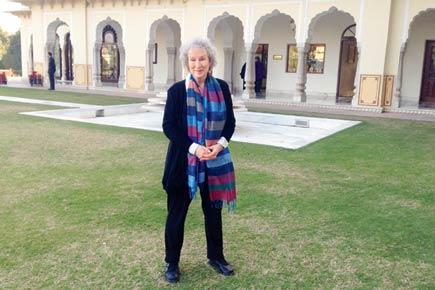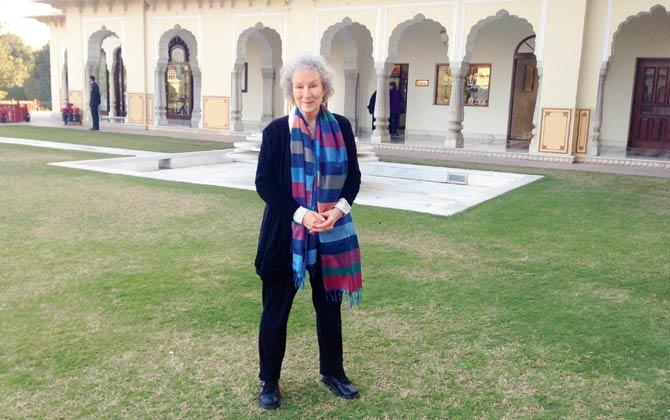From being cool about books going digital to India’s flyovers, Canadian icon Margaret Atwood tells all in an exclusive interview with Suprita Mitter. Here's the full interview with the veteran author of The Heart Goes Last (Bloomsbury)

 Q When did you start writing? How did you know you wanted to be an author?
Q When did you start writing? How did you know you wanted to be an author?
A. I started writing when I was seven. I wrote a story about an ant. Then, I moved to comics. Next, I stopped writing and started painting more. I was more visual for a while. I wanted to be an artist first and then a designer. Then, I wanted to be a biologist. I was good at that. All of a sudden, I went back to writing and that was more fun than anything. So I announced that I was going to be a writer much to everyone’s dismay. My family thought I wouldn’t be able to earn a living. My mother said to be able to write you need to know how to spell and I told her other people would do that for me. I started writing in college magazines and small literary magazines. I wrote my first novel when I was 23. It didn’t get published. A publisher told me they were interested but only if I could change the ending. I refused. It was ahead of its time. The heroine was wondering whether to push the leading man off the ledge. In the 1960s, they weren’t ready for that. The second novel I wrote got published. It was The Edible Woman. At that time, I also won a top literary award in Canada for a poem I had written. Top because there was only one literary award that time. I borrowed my friend’s dress to attend the ceremony because I didn't have one. My roommates burnt my hush puppies because they thought I wasn’t snazzy enough.
ADVERTISEMENT

Margaret Atwood
Q What was your first interview like?
A. The person interviewing me was a war journalist who had just returned from the Vietnam war. His publication told him to interview this 27-year-old female poet. So here I was in my red mini dress and fishnet stockings, and there was this war correspondent. We looked at each other and looked at each other, Finally, he said why don’t you say something interesting like you write all your poetry on drugs? (laughs). I did my first book signing in the men’s undergarment section of a departmental store. The publicist thought it was a good location as it was near the escalator. These poor men came to buy their underwear at lunch hour and there was this woman signing copies of a book called The Edible Woman. They ran in the other direction. This was in 1969. New publishing houses has started then in many former colonial countries. Festivals like these and reading sessions in coffee houses started in the 1960s too. We built a writer’s trust.
Q This is your fourth visit to India. The last one was 27 years ago. What have been some of the most noticeable changes?
A. The highways and the air pollution. The liberation of the Internet. The airport, which was tiny with one terminal; the new one in Delhi is huge. These are things that have changed all over the world though. Development is here but not for everyone. There's a lot of inequality and that gap has increased. You can't go on that way forever.
Q You are viewed as a writer who favours e-books...
A. I am not threatened by e-books. Paper books have made a come back. Each platform is good for something; e-books are good for travel, for students who are writing papers. Sometimes, I buy e-books of my own books if I'm travelling. For authors, you make an e-book and send it to a publisher. It gets there faster. It’s very convenient. Also, lot of people who can't access expensive books can access these. There's higher saturation though with reading online.
Q What's the most important thing you tell students?
A. I teach them how to do just the first chapter and teach them to do it for the real world. In the real world there are bookstores. When someone walks in they either buy your book or they don't. I tell them to close their eyes and visualise the cover of their book. People have to pick from among hundreds of titles. They read the back of the book which may have some good reccos from others, The front may usually have a synopsis written by an intern in the publishing house, which is what usually happens. You have hooked the audience in the first five pages; they will read the next 20.
Q Having written across genres which ones did you enjoy the most?
A. I wouldn't have written them if I wasn't interested so all of them. I find book reviewing difficult. I do it once in a while because it has to be done. I don't review things I have no expertise on. I did a piece on Game Of
Thrones sometime back.
Q What do you read for leisure?
A. I read almost anything. Right now, I am reading a memoir by Diana Athill who used to be my editor and whom I know so I am enjoying it.
Q You released a new book; The Heart Goes Last, and are working on two graphic novels.
A. The first one, the artist is at the inking stage. It's a big project. The second one is based on the cat and bird awareness programme. It creates awareness about bird conservation in an interesting way. You write a
script for a graphic novel just like you write a script for a film scene by scene.
 Subscribe today by clicking the link and stay updated with the latest news!" Click here!
Subscribe today by clicking the link and stay updated with the latest news!" Click here!






